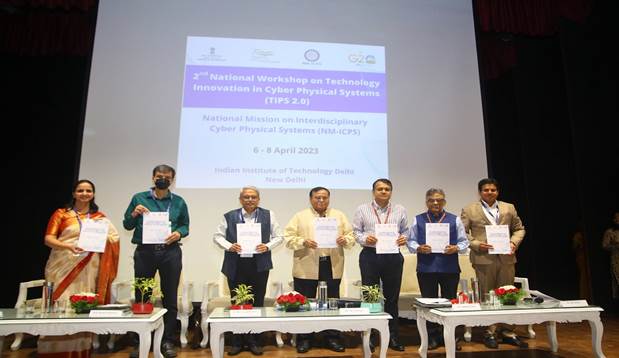Experts deliberated on ways to strengthen the National Mission in Interdisciplinary Cyber Physical Systems (NM-ICPS) with the help of disruptive technologies, effective translation, and commercialization of technologies so that it can become a major driver of economic growth of the country at the National Workshop on Technology Innovation in Cyber-Physical Systems (TIPS).
“Cyber Physical Systems (CPS) will play a major role in areas like health and medicine, intelligent transportation, as well as smart manufacturing in the future. Such a role needs a change in the trajectory of CPS through the introduction of new technologies like Artificial Intelligence, IoT, and Robotics, which will be the future drivers of CPS,” said Dr. V.K. Saraswat, Member (S&T), NITI Aayog at the 2nd TIPS workshop.
He also insisted on identifying the windows that have been created by the NM-ICPS mission that was launched in 2018 and on quantification of the value addition that has already been done to make India ready to participate in the globally growing CPS market.

The Union Cabinet approved the National Mission on Interdisciplinary Cyber
Physical System (NM-ICPS) in December, 2018 at a total outlay of Rs.3660 Crores for a period of five years to be implemented by the Department of Science and Technology (DST). As part of the Mission implementation, 25 Technology Innovation Hubs (TIHs) have been established in advanced technologies in reputed institutes across the country. These TIHs focus on technology development and translation, human resource and skill development, entrepreneurship and start-ups development, and international collaborative research. For effective implementation of the Mission and to carry out the mandated activities by the TIHs, a series of workshops are being conducted for direct interaction between the Mission Office and its Expert Committee members and the TIHs.
Dr. Kris Gopalakrishnan, Chairman, Axilor Ventures, Bengaluru, and Chairman Governing Body, NM-ICPS, stressed in the need for growth in research and technology translation and for developing capacity in the system to utilize increased funding from the industry and from other sources at the 2nd National Workshop on Technology Innovation in Cyber Physical Systems (TIPS) during 6-8 April, 2023 at IIT, Delhi.
He highlighted the need for different types of collaborations through which the Technology Innovation Hubs can help in elevating technologies to higher TRL levels.
Prof. Ashok Jhunjhunwala, IIT Madras, elaborated on the steps the hubs can take in nurturing innovation and entrepreneurship and making innovators successful, while Prof. V Ramgopal Rao, Former Director, IIT Delhi, focused on how the hubs could bridge academic R&D with product innovation.
Dr. Akhilesh Gupta, Secretary SERB and Sr. Adviser, DST, explained how the hubs would work with the Governing Body and the Scientific Advisory Committee in synergy with the industry for translation and commercialization of technology while Prof. Rangan Banerjee, Director, IIT Delhi, outlined some of the achievements of the hub at IIT Delhi.
Each hub is a Section-8 Company, an independent entity within the host institute, and has been assigned a technology vertical in the areas of advanced technologies such as artificial intelligence and machine learning; technologies for the Internet of Things & Internet of Everything; Data Banks & Data Services, Data Analysis; Robotics & Autonomous Systems; Cyber Security and Cyber Security for Physical Infrastructure; Quantum technologies, etc. The NMICPS Mission aims to develop technology platforms to carry out R&D, translational research, product development, incubating & supporting start-ups, and commercialization.
NM-ICPS is a comprehensive Mission that brings together academia, industry,
government and international organizations and has created an ecosystem that fosters entrepreneurship, develops next-generation skilled manpower, catalyses translational research, and promotes the commercialization of CPS technologies.
The Mission is being implemented with all the TIHs undertaking activities under technology development, entrepreneurship development, human resource development, and international collaborations. It aims at technology development, translational research and commercialization in Cyber Physical Systems (CPS) and associated technologies, adoption of CPS technologies to address India specific National and regional issues, production of next-generation skilled manpower, catalyzing translational research, accelerating entrepreneurship and start-up ecosystem development in CPS technologies, giving impetus to advanced research in CPS technologies and higher education in Science, Technology and Engineering disciplines and bringing India at par with other advanced countries. It can transform key sectors of the Indian economy like healthcare, transportation, education, infrastructure, etc. and make them more efficient, safe, and sustainable to place India at par with other advanced countries.








